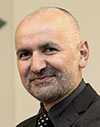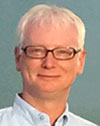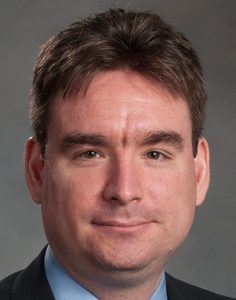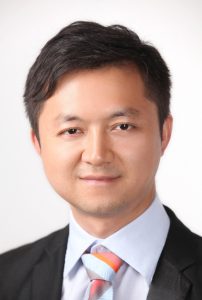Vladimir Crnojevic, BioSense Institute


Presentation: Internet of Agriculture
Data is the new gold – new economy is the data economy and this holds for agriculture as well. Over the last century we have gone from 1B people on the planet to 7B, primarily due to abundance of food caused by two revolutions in agriculture – machinery and chemicals. This trend is continuing and expected population of 10B requires new revolution – Agriculture 4.0, based on Industry 4.0 where data plays the major role. New sources of data, connectivity and storage, and new processing algorithms give completely new perspective on the future of agriculture and food sector.
The internet of things (IoT) has revolutionary potential. A smart web of sensors, actuators, cameras, robots, drones and other connected devices allows for an unprecedented level of control and automated decision-making. Over the last decade agricultural machines became valuable sources of data. Still, data from sensors were sparsely distributed for two reasons – lack of connectivity and high price of sensor with their limited capabilities. With penetration of IoT in agriculture, this situation is changing rapidly. Improved connectivity is not only providing access to the in-field data but is also driving the innovation in sensor technology, which should result in price cut, versatility, reliability and user-friendliness. With the help of IoT technologies higher yields and better quality produce should be expected. Pesticide and fertilizer use will drop and overall efficiency will be optimized. IoT technologies also enable better traceability of food, leading to increased food safety.
One of the major efforts for systematic approach to R&D in IoT application in agri-food domain is the flagship project IoF2020 – Internet of Food and Farm, which explores the potential of IoT-technologies for the European food and farming industry. The goal is ambitious: to make precision farming a reality and to take a vital step towards a more sustainable food value chain. The aim of IoF2020 is to build a lasting innovation ecosystem that fosters the uptake of IoT technologies. For this purpose key stakeholders along the food value chain are involved in IoF2020 together with technology service providers, software companies and academic research institutions. Nineteen use-cases organised around five sectors (arable, dairy, fruits, meat and vegetables) develop, test and demonstrate IoT technologies in an operational farm environment all over Europe.
Silvia Maria Fonseca Silveira Massruhá, General Director of Embrapa Agricultural Informatics
Silvia Massruhá obtained Ph.D. in Applied Computing at the National Institute for Space Research (2003 ) ( INPE ) , Master in Computer Science from the School of Electrical and Computer Engineering (1996 ) from State University of Campinas ( Unicamp ) and graduation in Systems Analysis – Pontifical Catholic University of Campinas (1988 ) . Since 1989, she is a researcher at Embrapa Agricultural Informatics where she has coordinated projects in the area of software engineering, artificial intelligence and computer science applied to agriculture with approximately 90 technical and scientific publications and 25 softwares in the areas of expert systems, abductive logic, fuzzy logic, machine learning, data mining and text applied to animal management and diagnosis of plant diseases. Since July 2015,Massruhá is the head of the Embrapa Agricultural Informatics occuping the Director General position. Massruhá is also a member of the Embrapa’s Information Technology Steering Committee (CGTI) and since October 2016, a member of Embrapa’s Strategy Management Committee (CGE). From August 2009 until March 2015,Massruhá occupied the position of Assistant Director of Research and Development of Embrapa Agricultural Informatics. President of the Brazilian Society of Information Technology in Agriculture – SBIAgro (2010-2011) and member of the Board of SBIAgro ( 2012-2013/2014-2015/2016-2017 ). Researcher was also representative of Embrapa, from 2013 until 2015, in are of TIC for Agriculture in the Regional Platform for Emerging Technologies of PROCISUR (Cooperative Program for the Technological Development of Agribusiness in Southern Cone) and collaborating professor in the postgraduate course of the Faculty of Engineering agricultural at Unicamp.
Presentation: IOT Perspectives in Brazilian Agriculture: From Biotechnology to Big Data for Sustainable and Smart Agriculture
The Brazilian Agricultural Research Corporation, Embrapa, was founded in 1973,and is under the aegis of the Brazilian Ministry of Agriculture, Livestock, and Food Supply. Since the foundation and with partners from the National Agricultural Research System, they have taken on the challenge to develop a genuinely Brazilian model of tropical agriculture and livestock to overcome the barriers that limited the production of food, fiber, and fuel for their country. This effort has helped to change Brazil. Nowadays, Brazil’s agriculture is one of the most efficient and sustainable ones in the planet. This presentation will include implementation strategy of how Brazil will introduce IOT in tropical Agriculture, what are some of the new technologies developed by Embrapa (Brazilian Agricultural Research Corporation), and new cooperative initiatives.
Jack Ng, CEO of Sky Greens Pte Ltd


With a strong background in engineering related works, Jack invented and patented Singapore’s first vertical soil-based rotating planting system using a water pulley system, and established Sky Greens Pte Ltd, with the aim of being Singapore’s first commercially viable vertical farm. His current role as the CEO includes leading the management team, developing solutions and setting the company’s strategic direction.
At the Ministry of National Development (MND) Urban Sustainability R&D Congress in June 2011, Sky Greens together with AVA won the Minister for National Development’s R&D Award 2011 (Merit Award) for Vertical Farming, an innovative and green solution addressing national urban food sustainability challenges for Singapore.
In October, 2014, Sky Urban Solutions Holding, the parent company of Sky Greens Pte Ltd, won the Top honors award, Green Technology Award from Singapore Business Federation in recognition of its vertical farming innovation that provides a sustainable green solution that has positive impact to urban agriculture. In August 2015, the company became the first Singaporean entity that won the INDEX award – the world’s biggest and probably most important global design prize in Copenhagen, Denmark that recognizes the potential impact of winners in solving the world’s most challenging problems. Jack is also the first ethnic Chinese to receive this prestigious honor for being the inventor. The company also received the International Diamond Prize for Quality by the European Society for Quality Research in Vienna, Austria later in December 2015.
Presentation: Farm to Table – From a Yuppie Trend to a Future Norm
- An introduction of Sky Greens – a pioneering vertical farming technology
- Current IoT application in SMART greenhouses
- How IoT and change in consumer buying behavior will shape farming landscape and overcome food loss challenge
Tom Penning, Irrometer Co., Inc.


Presentation: Is IoT the future of Ag?
To feed an expected world population of 9.1 billion by 2050, an increase of 1.5 billion from current levels, food production will also need to increase to meet this growing demand. Even though this represents a 34% increase in population growth, because of swelling urban sprawls, increasing income levels, producer demographics and expanded use of crops for bio-energy and other industrial purposes, crop production will need to be increased by more than 70% to satisfy all these needs.
To achieve this projected growth target in crop production, agriculture will have to rely on technology more than ever. Technology has already been integrated into farming methods to make farming more efficient. For example, farming is relying on sensors to trace, detect and diagnose issues with soils, crops, livestock machinery, etc. Similarly, remote sensing and precision agriculture are already optimizing farm inputs. However, these technologies might not be enough and will need to become more efficient in order to meet the exponential growth in crop production demand. It is therefore vital that we think of ways in which this could be possible. The Internet of Things (IoT) could be the catalyst that could make some of these existing technologies even more efficient. An IoT platform will allow for various and numerous devices in the field to exchange data efficiently and economically so that near real-time recommendations and prescriptions could be generated by systems such as Farm Management Information Systems (FMIS), making farming much more efficient.
This paper will describe a use case of how an IoT platform and communication technologies, focused primarily on collection of soil moisture data from agricultural fields, can be used. This data will be standardized so that exchange between irrigation management systems is seamless. AgGateway’s Precision Ag Irrigation Language (PAIL) and Standardized Precision Ag Data Exchange format (SPADE) will be used as the standardization and exchange tool respectively.
Ganesh Subramanian, Panimalar Institute of Technology, Chennai


He completed his Ph.D. degree in the area of “Efficient and Secure Routing Protocol for Wireless Sensor Networks” as a part-time candidate in Sathyabama University, Chennai, Tamilnadu, India. He is working as a Professor in the Department of Electronics and Communication Engineering at Panimalar Institute of Technology, Chennai. Also he is the Chief-Operations for Chennai based Aerial Robotic Company called Aero 360 where he handles Operations, team coordination and R&D activities. He is the mentor of Team Dronix, an aerial robotics student’s startup.
He has contributed and presented papers at IEEE international conferences in Kerala, Allahabad, China, Korea, and in Thailand. He has been invited and presented his project at National University of Singapore (NUS) during LSGCC -December 2013. He had published his research works in various reputed international and national journals.
The teams led by him have participated in International ROBOSUB competition held at San Diego,CA, USA, under the sponsorship of Indian Government during the month of July 2012, and in Singapore Autonomous Underwater Vehicle Competition (SAUVC) during the month of March 2013,March 2015 and March 2016.
Also he led teams during Singapore Robotics Game (SRG) 2014 as well as 2016. He had been Invited and presented as a speaker for “The Commercial UAV show Asia 2016” at Singapore , in “Small Unmanned Business System Exposition2017” at San Francisco, CA,USA , in “Drone Tech Europe 2017” at Bristol, U.K, in International workshop on Telemedicine and Medical drones-India sponsored by National Disaster Relief Forum of India as well as a Distinguished Panelist for IEEE Symposium on Drone Computing during October6, 2017 at Bengaluru, India
He has completed Nineteen years in the field of Research and Education.
For more information visit: www.teamdronix.com and check out their You tube channel: Team Dronix.
Publications at: https://scholar.google.co.in/citations?user=CWQACPcAAAAJ&hl=en
Research works at: orcid.org/0000-0002-3008-8969
Profile at: https://www.linkedin.com/in/dr-ganesh-subramanian-1a397963
Social contributions at You tube channel : Sanguine Entrepreneurs
Presentation: Drones/UAVs for Aerial surveillance –The Indian Perspective
The farming industry will become arguably more important than ever before in the next few decades. The IoT is set to push the future of farming to the next level. Smart agriculture is already becoming more commonplace among farmers, and high tech farming is quickly becoming the standard thanks to agricultural drones and sensors. The world will need to produce 70% more food in 2050 than it did in 2006 in order to feed the growing population of the Earth, according to the UN Food and Agriculture Organization. The main goal of this presentation is to focus on the impact of drones in precision farming and implement a Smart irrigation system through various networking technologies and their integration with IoT.
Mehmet Can Vuran, Department of Computer Science and Engineering, University of Nebraska-Lincoln,


Currently, he is the Susan J. Rosowski Associate Professor of Computer Science and Engineering at the University of Nebraska-Lincoln. Dr. Vuran received an NSF CAREER award in 2010 for “Bringing Wireless Sensor Networks Underground”. In 2014, 2015, and 2016, he was named a highly-cited researcher in computer science by Thomson Reuters. He received a Parents Recognition Award from UNL Parent’s Association in 2016. He is the co-author of Wireless Sensor Networks textbook and an editor in Computer Networks Journal, IEEE Transactions on Wireless Communications, and IEEE Communications Surveys and Tutorials Journal. His current research interests include wireless sensor networks, underground communications, cognitive radio networks, and cyber-physical networks.
Presentation: Overview of IoT in Agriculture
The projected increases in World population and the need for food have recently motivated novel information technology solutions to be deployed in crop fields within precision agriculture approaches. This will provide novel application areas and challenges for Internet of Things (IoT), agricultural big data, and cloud computing solutions. This vertical track on IoT in Agriculture will overview developments in crop field sensing, data delivery from crop fields to the cloud, agricultural information fusion, and agricultural automation. This new paradigm facilitates seamless integration of IoT sensors, machinery, and irrigation systems with the complex social network of growers, agronomists, crop consultants, and advisors. Recent advances in the theory and applications of distributed in-field sensing will be discussed. Major challenges related to agricultural big data applications will also be highlighted.
Wuxiong Zhang, Shanghai Institute of Microsystem and Information Technology (SIMIT)


Presentation: Massive IoT Monitoring System for the South-to-North Water Diversion Project in China
This talk introduces the design and implementation challenges of distinctive IoT technologies for the world longest water monitoring system of the South-to-North Water Diversion Project in China. This system consists of a variety of advanced sensors for monitoring weather, geological features, infrastructure health, water quality and quantity, and security. In particular, three key problems have been addressed: (1) real-time processing of large volume of mixed structured and unstructured sensing data from 100K+ sensors; (2) multi-hop data transmission over heterogeneous wireless networks (WSN/WLAN/GPRS/3G/4G) with strict constraints in end-to-end delay performance (<3 seconds) and connection reliability (>99.9%) for over 1430KM distance; and (3) web-based data integration and visualization in a comprehensive system for remote monitoring, dispatching, command and control functions at all times and all situations. Currently, this impressive IoT monitoring system covers the entire 1432 KM drainage basin from Danjiangkou Water Reservoir in Hunan Province to Beijing and Tianjin cities. It is providing crucial real-time information for day-to-day surveillance, operation and management of the world longest water diversion system.



